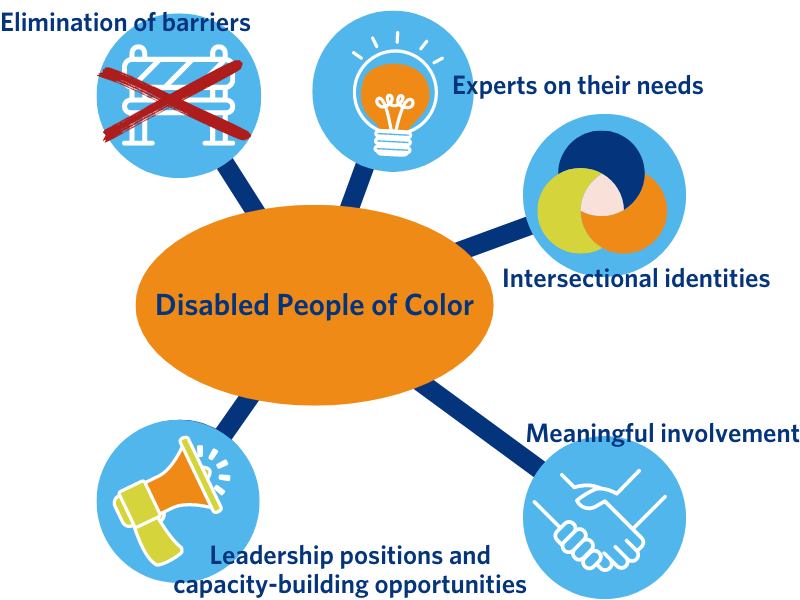CLEC Research
A growing body of research has been uncovering the compounding impact that structures of race, ethnicity and other markers of difference such as gender, citizenship and LGBTQ+ status have on the social, economic, and health outcomes of people of color with disabilities. It is imperative for researchers to consider the racialized and cultural contexts through which disabled people of color experience disability and the ways it differs from: 1) non-disabled people, including those within their own racial and ethnic communities and 2) white people with and without disabilities.
The overarching goal of the CLEC is to address gaps in our knowledge about inequities in community living and participation experiences and outcomes faced by disabled people of color and develop interventions to address equity, by leveraging existing and new data sources, developing new policy and systems change initiatives, and through active dissemination of findings and trainings for stakeholders.
Upcoming Webinars
Guiding Principles of Our Research and Knowledge Translation
CLEC research and knowledge translation are guided by the following principles:
- Disabled people of color with long-term services and supports (LTSS) needs face significant barriers in access to home- and community-based services (HCBS) and to culturally and linguistically appropriate services.
- Disabled people of color with LTSS needs are the experts in what they need.
- Disabled people of color with LTSS needs have intersecting identities that comprise their lived experiences, and particularly their experiences with the HCBS service and delivery system.
- Disabled people of color with LTSS needs must be meaningfully involved in all aspects of research and knowledge-translation activities.
- Disabled people of color with LTSS needs must be in leadership positions and receive capacity-building and mentoring opportunities related to community living research, advocacy, and service delivery.
 FIGURE. The guiding principles of CLEC's research and knowledge translation. At the center of these principles are disabled people of color, who experience barriers that community-living equity would work to eliminate. They are experts on their own needs and have intersectional identities that affect their experiences. They must be meaningfully involved in research and knowledge-translation activities and they must have leadership positions and receive capacity-building and mentoring opportunities.
FIGURE. The guiding principles of CLEC's research and knowledge translation. At the center of these principles are disabled people of color, who experience barriers that community-living equity would work to eliminate. They are experts on their own needs and have intersectional identities that affect their experiences. They must be meaningfully involved in research and knowledge-translation activities and they must have leadership positions and receive capacity-building and mentoring opportunities.
Core Target Population and Underserved Subpopulations of Focus
The core target population for the CLEC are people of color with disabilities who have long-term services and supports (LTSS) needs. LTSS refers to a wide range of health and social services provided to individuals who need assistance with personal care tasks or activities of daily living, such as eating, bathing, and dressing, or with instrumental tasks, such as medication management, meal preparation, and supports for community participation and employment. An estimated 12 to 14 million individuals in the U.S. have needs for LTSS. Within the population of individuals needing LTSS, our proposal primary focuses on racial and ethnic minorities, who we generally refer to as “people of color” in the proposal. It is known that Black, Latinx, and Native communities have higher needs for LTSS in comparison to whites. Moreover, due to the aging of the U.S. population and increased diversity, the number of racial and ethnic minorities needing LTSS is projected to increase substantially in the coming decades.
Aims, Research, and Knowledge Translation Activities
Generate detailed new knowledge about community living and participation disparities
- Racial and Ethnic Disparities in HCBS Access and Utilization
- Barriers and Facilitators in Access to HCBS for People of Color
Develop new or locate available systems-change initiatives or other promising practices for reducing community living and participation disparities
- Self-Direction and Community-Living Outcomes for People of Color
- Promising Practices in Peer Support Models to Advance Equity and Community
- Community-Living Outcomes for People of Color
- Policy Analysis and Development to Advance Community-Living Equity
Serve as a national resource for the conduct of disability and rehabilitation research in the community living and participation domain that is inclusive of people with disabilities from traditionally underserved communities
- Training
- Dissemination
- Technical Assistance



